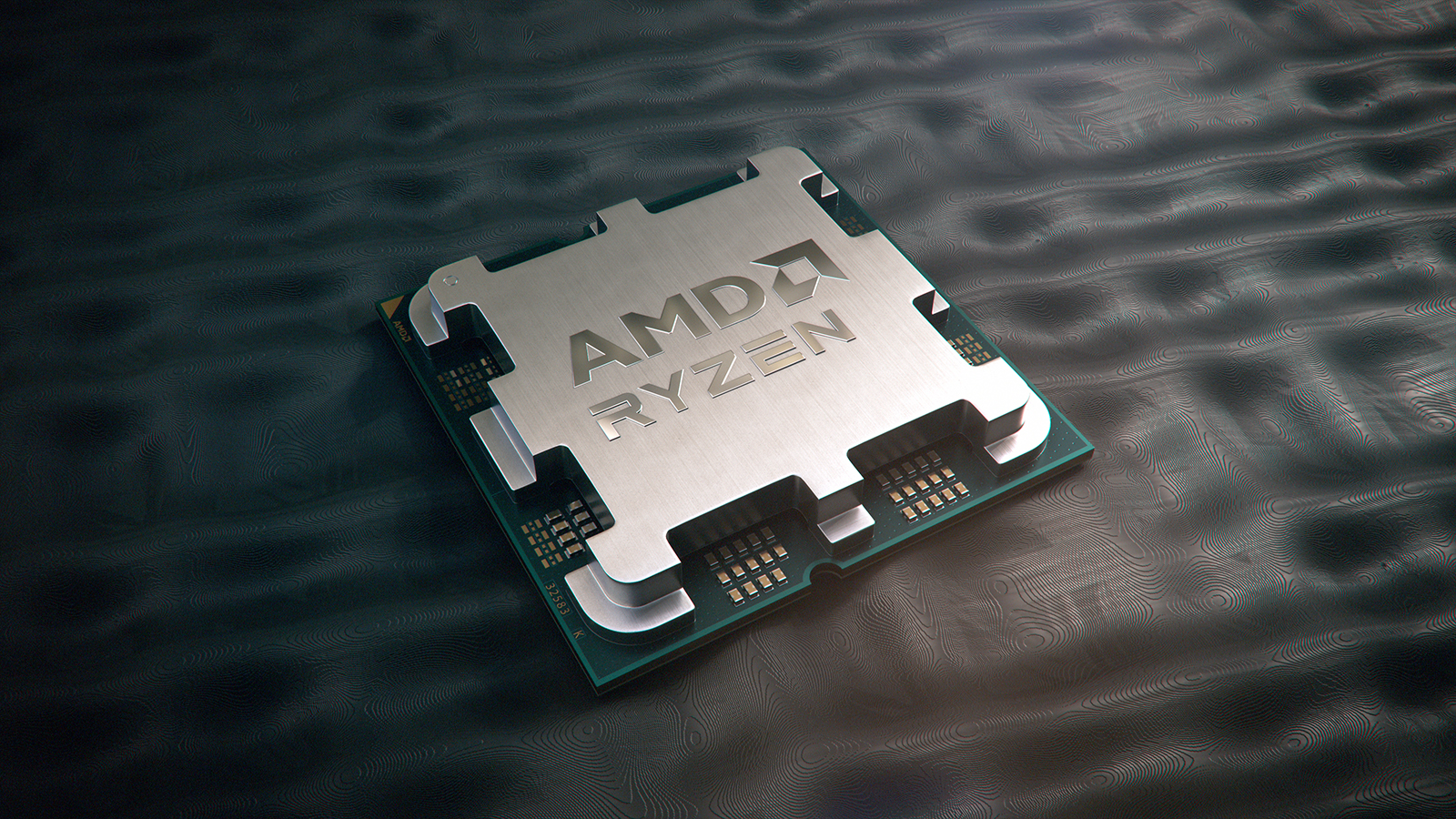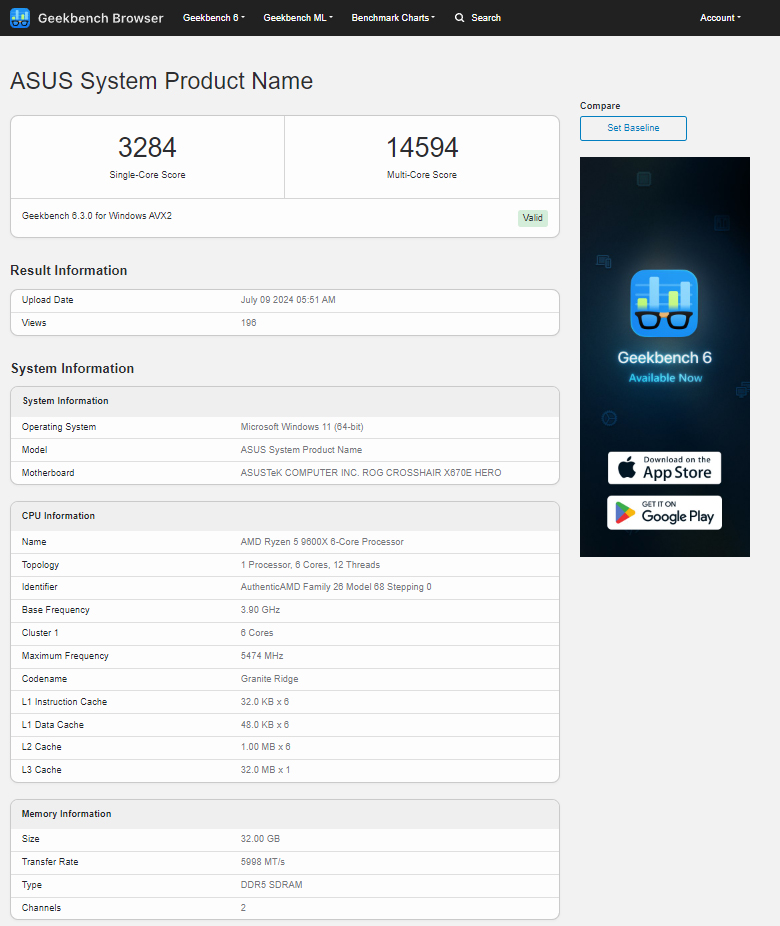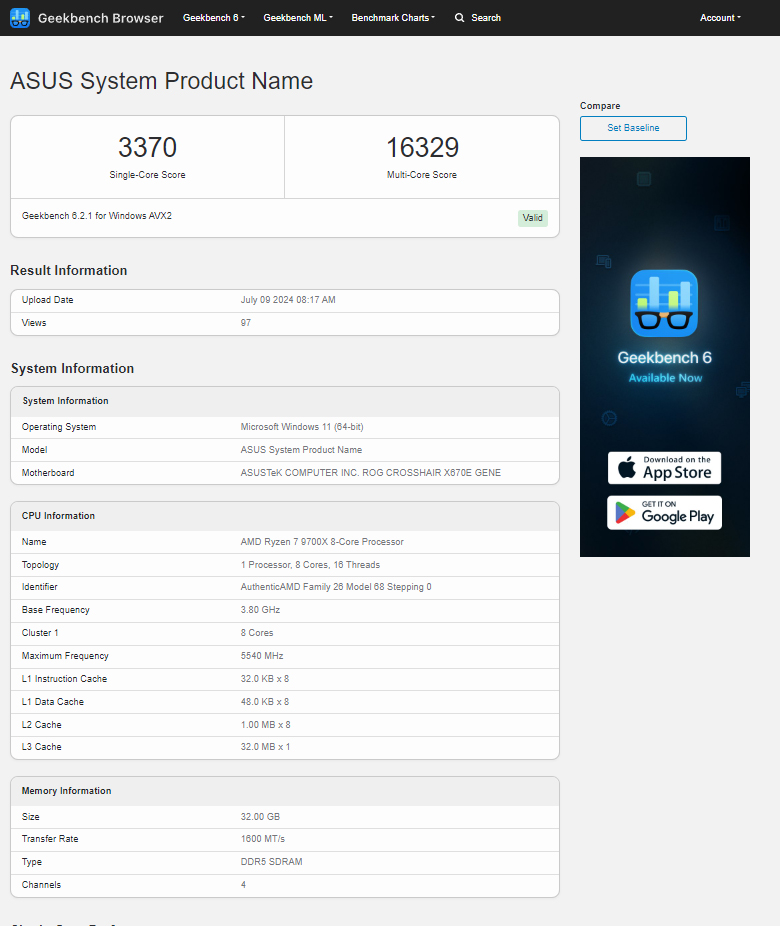AMD's Ryzen 9000 single-core performance again impresses in early Geekbench results — 9700X, 9600X dominate previous-gen AMD and Intel CPUs
These new chips are expected to arrive on the 31st and will sport AMD's Zen 5 architecture.

AMD's upcoming Ryzen 9000 chips aren't expected to arrive until July 31, but we're seeing some early benchmarks appear here and there. The @Benchleaks bot recently shared Ryzen 7 7900X and Ryzen 5 9600X results on X, revealing performance higher than AMD's and Intel's top previous-generation chips.
These leaked performance numbers usually come from PC manufacturers conducting final testing of their retail units before they go on sale. However, you should still take these results with a grain of salt, as these companies can change the final hardware configurations before they hit store shelves. Also, the results come from just a single test of each processor; it will take several more tests before we can see the general performance trends for AMD's latest chips.


Nevertheless, the two tests show the processors paired with 32GB RAM DDR5 RAM, with the 9700X mounted to an Asus ROG Crosshair X670E Gene and the 9600X on an X670E Hero motherboard.
Geekbench reports that the Ryzen 7 9700X has eight cores and 16 threads, a base frequency of 3.8 GHz, a max frequency of 5.54 GHz, and 32MB of L3 cache. On the other hand, the Ryzen 5 9600X has six cores and 12 threads, a 3.9 GHz base frequency, and a 5.47 GHz max frequency. It also has the same 32MB L3 Cache.
These are the Geekbench 6 results of other processors so we can see how these new processors compare:
| Processor | Clock Speed (Base / Boost) | Cores / Threads | Single-Core | Multi-Core |
|---|---|---|---|---|
| AMD Ryzen 7 9700X | 3.8 GHz / 5.5 GHz | 8 / 16 | 3370 | 16329 |
| AMD Ryzen 7 7700X | 4.5 GHz / 5.4 GHz | 8 / 16 | 2912 | 15272 |
| Intel Core i7-14700K | 3.4 GHz / 5.6 GHz | 8+12 / 16+12 | 2945 | 19275 |
| AMD Ryzen 5 9600X | 3.9 GHz / 5.4 GHz | 6 / 12 | 3284 | 14594 |
| AMD Ryzen 5 7600X | 4.7 GHz / 5.3 GHz | 6 / 12 | 2868 | 12825 |
| Intel Core i5-14600K | 3.5 GHz / 4.0 GHz | 6+8 / 12+8 | 2798 | 15881 |
Both Ryzen 9000-series processors outperform the previous generation AMD and Intel chips in single-core score performance despite having a lower base or boost clock, probably owing to AMD’s new Zen 5 architecture. Nevertheless, Intel’s 14th-gen chips still outperform them in the multi-core department, especially with their P-core / E-core architecture.
While the benchmarks may show the general theoretical performance of a processor, how fast your computer will be will still vary with the components you get, plus your luck with the silicon lottery. And before you make a long-term purchase of such a significant PC part, you should always wait for benchmarks that put these chips through their paces in both theoretical and real-world applications.
Get Tom's Hardware's best news and in-depth reviews, straight to your inbox.

Jowi Morales is a tech enthusiast with years of experience working in the industry. He’s been writing with several tech publications since 2021, where he’s been interested in tech hardware and consumer electronics.
-
jeremyj_83 The table has the wrong boost speed for the i5-14600k. The table says 3.5/4.0GHz, however, the 4.0GHz boost is the E-core boost rate. The P-cores have a boost rate of 5.3GHz.Reply -
usertests 9600X will be good if it is cheap and slightly beats the 14900KS in gaming on average.Reply
Then 9800X3D will come in with the real gains. Arrow Lake might only be able to tie it.
Of course, most people don't really need any of this stuff for gaming. Older chips are fine. -
ottonis "Nevertheless, Intel’s 14th-gen chips still outperform them in the multi-core department"Reply
Well, this is no surprise. After all, the 14700 has 12 more cores than the Ryzen 9700 (8+12 vs 8).
We will see how things will pan out, when AMD CPUs with 12 and 16 cores see the light of the day. Their multi-core performance numbers should be significantly above anything Intel's 14th gen has to offer. -
TerryLaze Reply
How is it supposed to beat the 14900ks if it doesn't even beat the 14600k in multithreaded?!usertests said:9600X will be good if it is cheap and slightly beats the 14900KS in gaming on average.
The single core scores are with actually only one core doing any work, you won't find that while gaming anymore.
Also they are from a benchmarking app which doesn't translate to gaming speed. -
Reply
The @Benchleaks bot recently shared Ryzen 7 7900X and Ryzen 5 9600X results on X,
Typo. It should be Ryzen 7 9700X.
Nevertheless, the two tests show the processors paired with 32GB RAM DDR5 RAM, with the 9700X mounted to an Asus ROG Crosshair X670E Gene and the 9600X on an X670E Hero motherboard.
Ryzen 7 9700X was also tested on the same platform/mobo as well, ASUS ROG Crosshair X670E HERO motherboard. It scored 3312 points in the single-core and 16,431 points in the multi-core tests
https://browser.geekbench.com/v6/cpu/6838863
1810539882948747467View: https://x.com/BenchLeaks/status/1810539882948747467
Btw, the article fails to mention any percentage increase in the score points. You just listed a chart/table. POOR quality reporting as always !
Should have included the Core i9-14900K/KS processor as well, since these AMD chips are slightly faster in ST score.
But this won't necessarily translate to real world gaming performance, so nothing to get too excited about, just yet. Wait for proper 3'rd party gaming benchmarks.
Although, if we compare previous gen Ryzen parts, these new AM5 chips are faster. Ryzen 7 9700X appears to be roughly 14% faster than its predecessor in ST, the Ryzen 7 7700X. And 7.6% in MT score.
Same with the 9600X.
Ryzen 5 9600X vs Ryzen 5 7600X (Single-Core): +15%
Ryzen 5 9600X vs Ryzen 5 7600X (Multi-Core): +14% -
usertests Reply
Most games are not going to run more than 1-2 cores hard. 6 fast cores is fine.TerryLaze said:How is it supposed to beat the 14900ks if it doesn't even beat the 14600k in multithreaded?! -
TheJoker2020 Reply
Multithreaded benchmark results is a long way from being the same as "in gaming on average" which is what your reply is replying to.TerryLaze said:How is it supposed to beat the 14900ks if it doesn't even beat the 14600k in multithreaded?! -
TerryLaze Reply
That is much different from what I'm saying, clock speeds rapidly drop when more than one single core is doing work.usertests said:Most games are not going to run more than 1-2 cores hard. 6 fast cores is fine.
You can see that from the chart by comparing single to multi scores.
Sure but so are single core scores, even more so since more games use more cores than fewer cores.TheJoker2020 said:Multithreaded benchmark results is a long way from being the same as "in gaming on average" which is what your reply is replying to. -
jeremyj_83 Reply
The Videocardz link above shows that the 9900X (12c/24t) has a 2.5% MT advantage over the 14700K (20c/28t) and 7950X (16c/32t), the 9600X (6c/12t) has a 9% MT disadvantage over the 14600K (14c/20t), the 9700X (8c/16t) has a 3.5% advantage over the 14600K. Overall the Zen 5 CPUs are preforming quite well despite a core and thread disadvantage.TerryLaze said:That is much different from what I'm saying, clock speeds rapidly drop when more than one single core is doing work.
You can see that from the chart by comparing single to multi scores.
Sure but so are single core scores, even more so since more games use more cores than fewer cores. -
TheJoker2020 Reply
Well yes of course, but "benchmarks" that are specifically designed to BE a benchmark rather than an actual program / app / game that is then benchmarked do not give results that are accurate compared to modern gaming because of the way that the cores / threads are used in reality vs a "benchmark".TerryLaze said:Sure but so are single core scores, even more so since more games use more cores than fewer cores.
This is analogous to looking at the benchmarks of SSD's, and you see benchmarks of what they "can" do, but the reality when an actual program / app / game loading is benchmarked is very different.
Ultimately we will just have to wait and see and look at multiple reviews and specifically their setups.